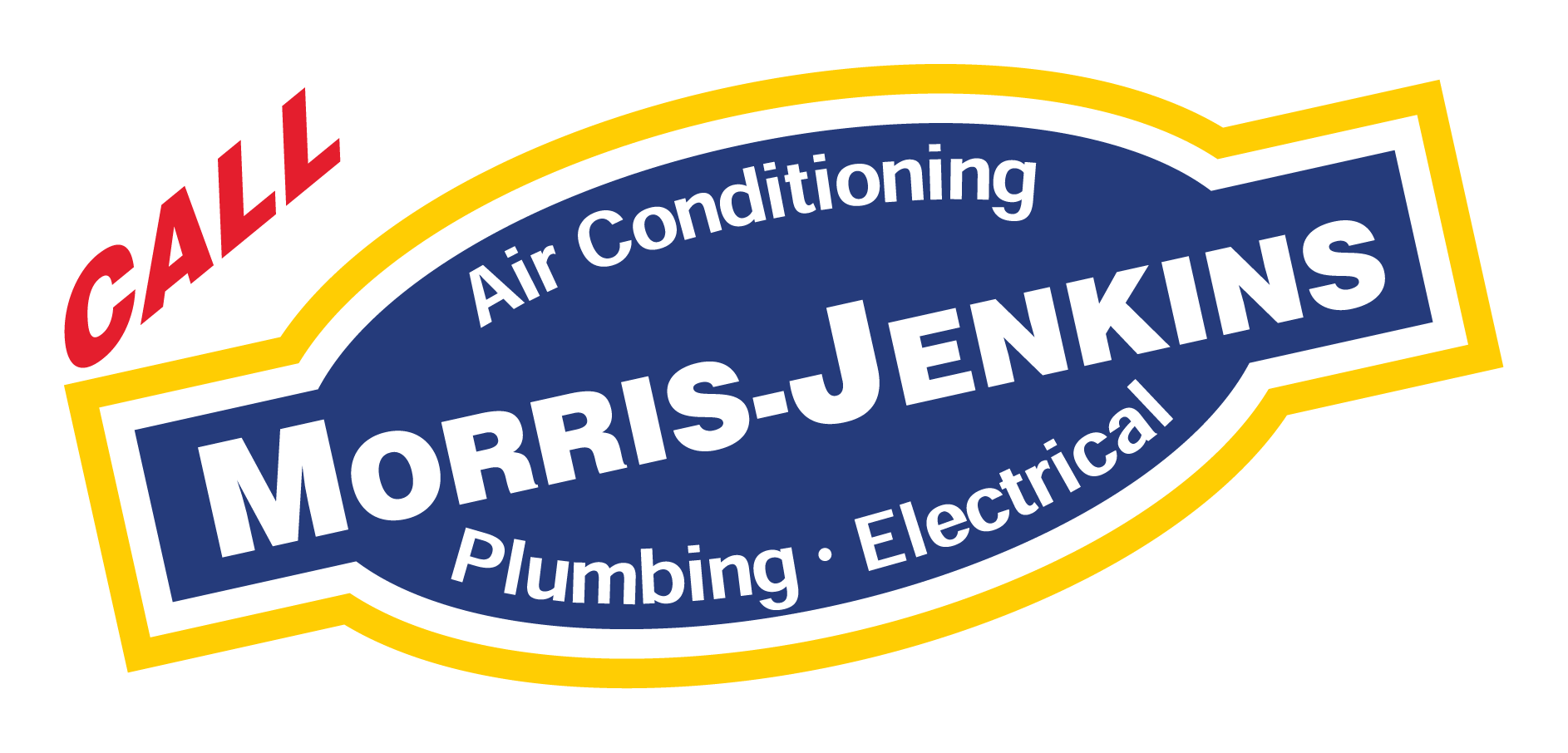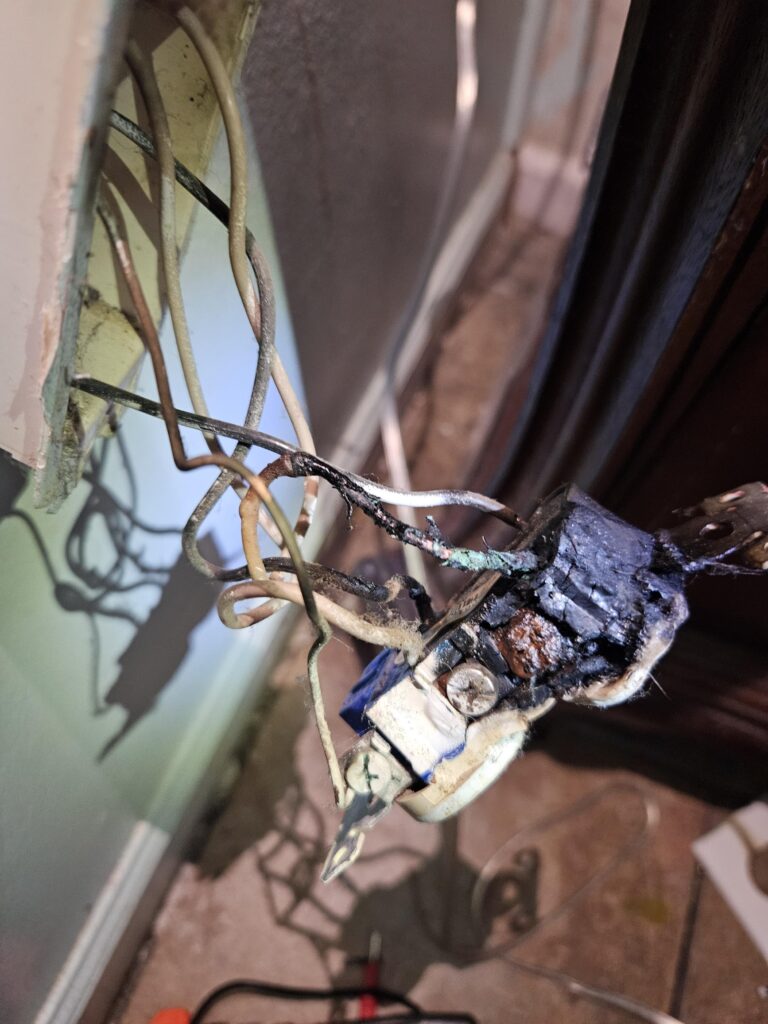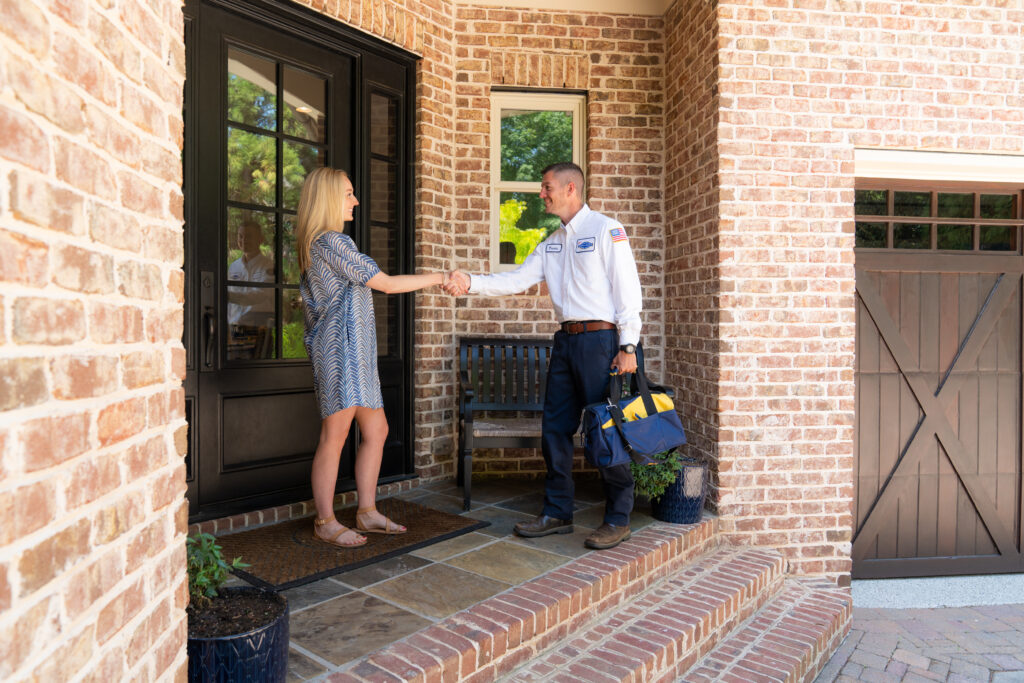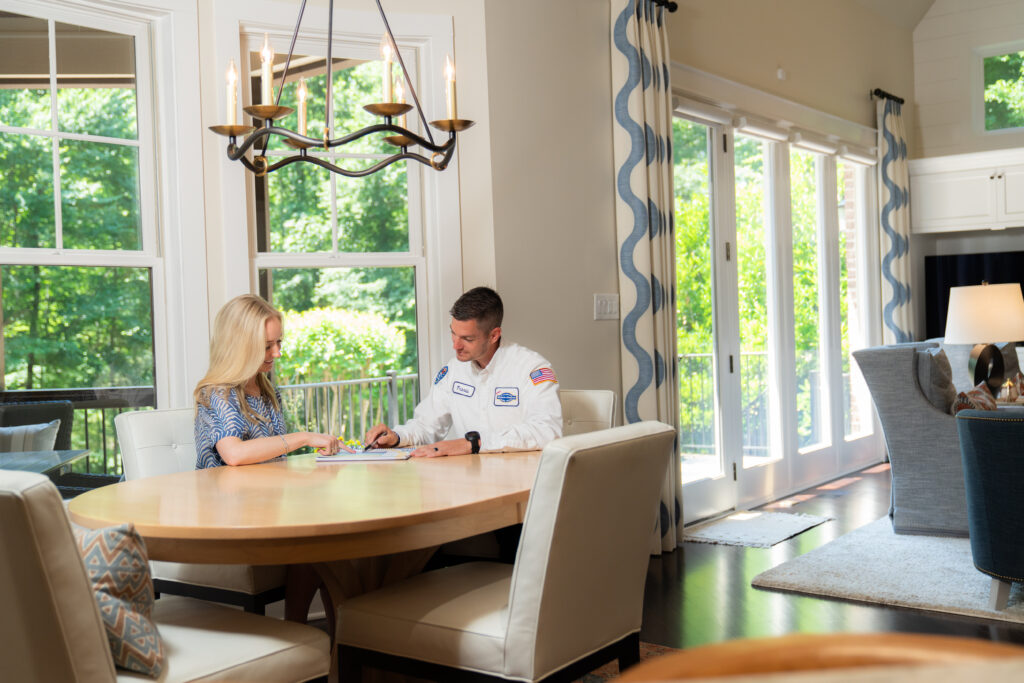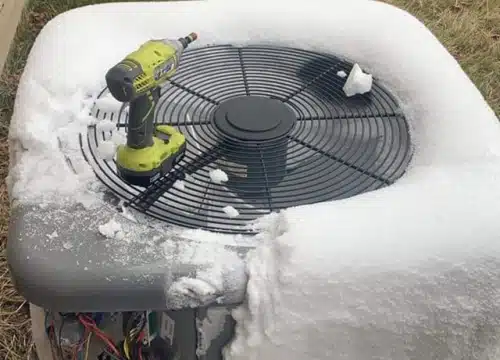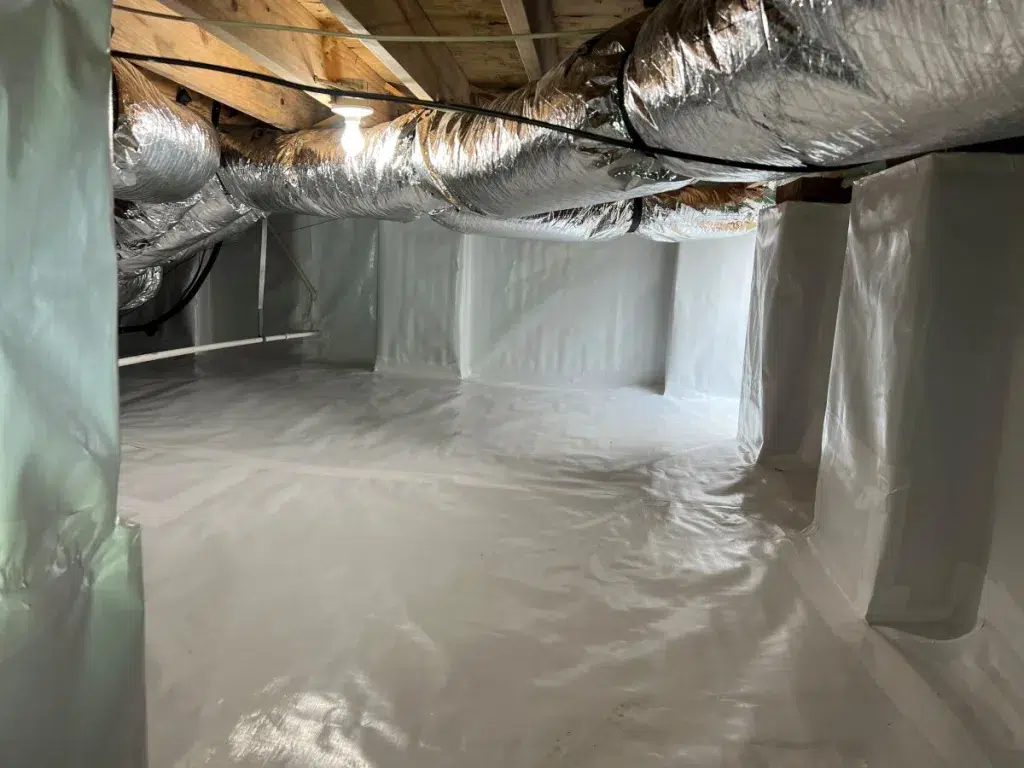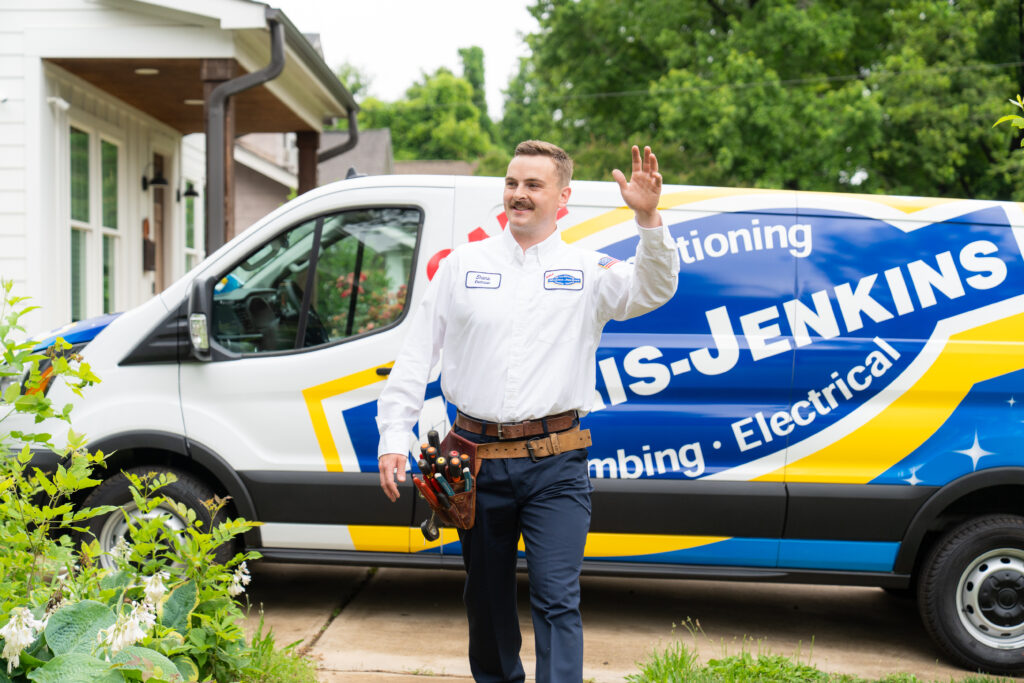Keeping your home comfortable can be a struggle (not to mention expensive). You shouldn’t have to feel like you’re always battling drafty rooms, stuffy air, or that one weirdly hot room in the house.
We’ve all been there, and Morris-Jenkins has some tricks up our sleeves to help make your home feel just right without sending energy costs through the roofs. Here are some of the most common questions we see about home performance so you can get the answers you need!
Indoor Air Quality FAQs
How Can I Improve My Indoor Air Quality?
Before you can improve your home’s indoor air quality (IAQ), you need to know what’s causing the problem. Is it dust? Pet dander? High humidity? Lots of things can be at fault, but pinpointing the exact issue is the first step.
Once you know what’s causing poor air quality, you can start tackling it with the right equipment and services! From air purifiers to UV air cleaners, there are lots of different systems that are designed to keep your air free from those things you don’t want (allergens, germs, odors, you know the deal).
Not sure which one’s right for your home? Ask Morris-Jenkins! We’re here to help!
What Are Some Common Indoor Air Quality Systems?
Dealing with air quality issues? There are plenty of different systems that can help! Some of the most common indoor air quality systems are air purifiers, carbon monoxide detectors, media air cleaners, thermostats, UV air cleaners, and UV lights.
And we get it; that many different types of systems and equipment can be overwhelming if you’re not sure where to start. That’s why we’re here to help you make sense of it all. Our techs can take a look at your home, talk with you about what you’re experiencing, and recommend the right solution based on your needs and budget. Reach out to Morris-Jenkins to learn more!
How Does Indoor Air Quality Affect Your Health?
Have allergies, asthma, or other respiratory issues? Then poor air quality can take a serious toll on your health! Whether it’s dust, pet dander, or growth, breathing in all that junk day after day can make symptoms worse and leave you feeling tired, congested, or just plain bad.
Even if you don’t have existing health issues, bad air can still cause headaches, sneezing, dry skin, and trouble sleeping. Over time, it can wear your body down without you even realizing it. Using the right indoor air quality systems, though, can make all the difference, keeping your home safe and healthy all year round!
What Are HEPA Filters?
HEPA, or High-Efficiency Particulate Air, filters are designed to catch even the smallest airborne particles and pull them out of your air supply. You probably know that your HVAC system has filters (or at least we hope you do), but not all filters are created equal. Those ones that you replace every few months in your HVAC system only catch the bigger stuff, like dust bunnies and pet hair.
But HEPA filters go a step further. They’re built to trap the super tiny stuff you can’t see, like pollen, growth, and even some bacteria and viruses. That makes them a great choice if someone in your home has allergies, asthma, or other breathing issues. Not all HVAC systems are designed to handle HEPA filters, though, so it’s important to have one of our pros take a look first.
How Can Indoor Air Quality Affect My Entire Home?
Indoor air quality doesn’t just affect your lungs; it can impact your entire house! It can make your home feel stuff, cause bad smells, and even lead to growth in spots you can’t see (like ductwork or crawl spaces).
Too much humidity in the air can warp your floors, mess with your furniture, and make everything feel damp and uncomfortable. On the flip side, air that’s too dry can lead to static shocks and cracked wood. Poor air quality can even make your HVAC system work harder than it should, driving up your energy bills and wearing your system out faster.
What Is Pure Flow?
The air that’s in your home has been there a while, getting recycled and breathed over and over again. How sure are you that your air is pure?
Have you ever heard of ductwork? It’s those big, crinkly-looking silver tubes in your attic or crawl space. They deliver air from your heating and cooling system to the rest of your home! Pure Flow is the specific ductwork Morris-Jenkins uses to get your home the purest air and the best flow to keep your family comfortable.
Why Does My Home Need Pure Flow?
Think of your heating and cooling system as the heart of your HVAC system and your ductwork as the arteries. A lot of the time when you have airflow issues, the problem isn’t with the heart—it’s with the arteries. It might be time to talk to a Morris-Jenkins tech about installing Pure Flow if you’ve been having problems like:
- Rooms that are hotter or colder than others
- Strange smells (such as lingering food or pet odors)
- High humidity
- Allergies
- Growth on your intake vents
When someone in your family has a virus and they’re coughing or sneezing, that virus can circulate through your ductwork, infecting other family members. If you cook and don’t have a range hood, food smells can get trapped in your ductwork and recirculate through your home well after that meal. If you take a shower and don’t turn on the exhaust fan, moisture from your bathroom can get into your ductwork and lead to humidity problems or even growth.
And if your ductwork has any holes or leaks in your crawl space or attic, you’re also looking at musty air, pesticides, and more getting into your family’s air. Installing Pure Flow with Morris-Jenkins gives your family pure air with the best flow possible, keeping you feeling better and more comfortable!
What Should I Expect During Pure Flow Installation?
After you’ve talked to one of our experts and decided installing Pure Flow is the right move for your home, you wanna know what the installation is gonna be like! Don’t stress, we make things easy for you. Usually, installing Pure Flow takes us between one and two days from start to finish, so we’ll be out of your home in no time! We’ll carefully remove all your old ductwork and keep your home clean throughout the process.
Once your Pure Flow is installed, we’ll go through different rooms to test and make sure your air is both pure and flowing well. We won’t call the job done until it’s something we can be proud of!
Whenever we install Pure Flow, a county inspection is required, but don’t worry, we cover the cost and handle scheduling it, so you don’t have to think about it. Just sit back and enjoy the clean air in your home!
Crawl Space FAQs
What Are Crawl Spaces For?
All homes have to rest on some kind of foundation to support it, and for lots of different homes, that foundation is a crawl space. They create a buffer between your home and the ground, which can help protect it from moisture and pests. They’re important because they also give your HVAC, plumbing, and electrical systems a place to live without being buried in the ground or crammed into your living space.
But if a crawl space isn’t sealed or maintained well, it can lead to all kinds of problems for the rest of your home. That’s why it’s important to keep an eye on it and make sure it’s not dealing with any problems that leave your whole home feeling uncomfortable.
What Are the Most Common Crawl Space Problems?
crawl spaces are in such close contact with the ground that they’re vulnerable to moisture and pests that can creep in without you even noticing. Moisture is one of the biggest problems, and it can lead to musty smells, growth, and even damage to your floor joists. Pests like bugs and rodents love dark, damp spaces, and an unsealed crawl space is basically an open invitation
If your crawl space is dealing with trouble, you’re probably gonna notice things like failing insulation, high humidity, and even standing water. These can drive up your energy bills and drive down your comfort.
Having crawl space problems? Let us know! Call Morris-Jenkins today for help!
What Is Crawl Space Encapsulation?
When a vapor barrier isn’t enough to handle the extreme humidity issues coming from your crawl space, it might be time to consider crawl space encapsulation. This is a great way to keep humidity levels down in your home.
Most homes with crawl spaces just need a vapor barrier, but if you struggle with extreme humidity issues in your home, this might be a better choice for your family. In its most basic sense, crawl space encapsulation is when we wrap up your crawl space entirely in a thick white membrane. We also take some other measures (more on that later) to make sure your humidity problems are a thing of the past!
Why Do I Need My Crawl Space Encapsulated?
If you’re having any of these problems in your home, crawl space encapsulation might be the right move for you:
- Uncomfortable humidity in the home
- Bowing hardwood floors
- Bad odors (musty smells)
- Creaking floors
- Rotting floor joists
- Growth on the floor joists
Sometimes, a vapor barrier is enough to help, but not always. Give us a call and we can send one of our experts out for free to take a look at your crawl space. They’ll inspect some things in your home and ask you some questions to get an idea of the full scope of your home’s humidity problems. Then, they can recommend the best course of action to get your home cozy and moisture-free before you know it!
What Is Involved in a Crawl Space Encapsulation?
When you decide to have us encapsulate your crawl space, our team will clear out anything in your crawl space, including old insulation. We’ll add insulation under the floor or against the brick, seal it with a white membrane (it feels like a pool liner!), and handle any water mitigation (this can be things like French drains or a sump pump). No matter the details, we’ll talk to you about it before we start any work, so you know what to expect! Because it’s a complex process, it tends to take us a few days to finish, but you’ll be proud of your crawl space when we’re done.
When we’re done, you’ll have a humidity solution that can last forever if it’s taken care of!
What Is a Vapor Barrier?
If you have a crawl space, have you ever noticed a thin layer of plastic across the ground? Maybe yours is still intact, or maybe it’s tattered and in a bunch of small pieces. If your house is old, you may not even have one at all.
That plastic layer is what’s called a vapor barrier, and they’re meant to keep moisture out of your crawl space and home.
Why Do I Need a Vapor Barrier?
The ground in your crawl space has moisture in it that could evaporate and make your crawl space and home musty and humid. If you have a crawl space, you might be due for a new vapor barrier if you’re noticing problems like:
- Musty smells
- Humidity issues
- Hardwood floors buckling
- Exposed dirt in your crawl space
When you call Morris-Jenkins for help with your vapor barrier, we’ll send an expert out for a free crawl space consultation. They’ll take a close look at your crawl space to see if your vapor barrier is doing its job or if it’s time for a replacement. A new vapor barrier could help keep your home comfortable!
Attic Insulation FAQs
Why Do I Need Attic Insulation?
Even the best and newest heating and cooling system will have a hard time keeping your home cozy if you don’t have great insulation. Insulation is the material in your attic that helps keep the indoor temperature indoors and the outdoor temperature outdoors. When your home doesn’t have enough insulation, you might have problems like:
- An AC or furnace that runs all the time
- High utility bills
- Inconsistent temperatures in your home
- Cold drafts
- Walls and floors that feel cold to the touch
- Some rooms that are hotter or colder than others
If you suspect your home needs more/better insulation, give us a call! We can have one of our experts out to do an assessment. They’ll not only check how much insulation your home has, but what it’s made out of, what kind of condition it’s in, and whether it truly is the cause of the problems you’re noticing. One way or another, we’re gonna get your home comfortable, so don’t worry!
What Is Blown-In Insulation?
Attics can be tough to access and feature unique layouts that can make it tough to insulate them evenly with traditional materials like batts or rolls. Blown-in insulation can evenly cover those hard-to-reach spaces by filling in gaps, corners, and low spots that other insulation might miss. This creates a thick, even blanket of insulation across the attic.
At Morris-Jenkins, we blow-in Comfort Cloud insulation because it’s high-quality, long-lasting, and great at keeping your home comfortable year-round. It holds its shape over time, so you don’t have to worry about it settling or thinning out. Since it fills every nook and cranny, it helps your heating and cooling system run more efficiently, which can save you money on your energy bills.
How Long Does It Take to Insulate an Attic?
The length of an attic insulation appointment pretty much depends on the layout and size of the attic. If your attic is on the smaller side and has a fairly straightforward layout, the job can usually be done in just a few hours.
For larger attics or ones with tight corners, low ceilings, or tricky access points, it might take a little longer. Most of the time, though, we can complete everything in one day. When you work with Morris-Jenkins, we’ll always let you know what to expect ahead of time so there are no surprises.
How Long Does Attic Insulation Last?
Good attic insulation can last a really long time, especially if it was installed correctly and your attic stays dry and sealed. On average, blown-in insulation will last around 20-30 years.
Comfort Cloud insulation is designed to hold its shape and stay in place, so you don’t have to worry about it settling or breaking down. The best way to know if your insulation is still doing its job is to have it inspected every so often. We’re happy to come take a look and let you know if it’s time for an upgrade.
What Is Comfort Cloud?
Comfort Cloud is the specific insulation we use. It’s high quality and will save you money on your utility bills. It does an amazing job keeping your home comfortable and helping your HVAC system run more efficiently. Because your home will maintain a good temperature easier, your heating and cooling system won’t have to run as often or work as hard to regulate your home. This also helps your system live longer!
Comfort Cloud is a permanent investment in your home—you’ll never have to have it installed again! Unlike other types of insulation, Comfort Cloud holds its form and depth, so you don’t have to worry about needing more. One way or another, we’re gonna get your home comfortable, so don’t worry!
Can I Install Attic Insulation Myself?
There are some types of attic insulation you can do yourself, like roll insulation, but none of them last as long or work as well as blown insulation. Comfort Cloud (the insulation we use) is a type of blown insulation. This means we bring a machine to your house (it stays outside), and we connect a big tube from the machine to your attic. We’ll use that to blow insulation directly into your attic, which fills all the nooks and crannies and gives you a thick, fluffy layer of insulation that’ll last a really, really long time.
Looking for Home Performance Solutions in Charlotte? Contact Morris-Jenkins!
At its core, home performance is about staying comfortable without spending an arm and a leg on energy bills. Morris-Jenkins helps homeowners across Charlotte, NC, and the surrounding areas get the home performance systems, equipment, and services they need, when they need them most!
We’re not here to upsell you on stuff you don’t need. We’re here to help you understand what’s going on with your home and walk you through your options in plain English. Give us a call or schedule online. We’ll get someone out there to take a look and help make your home the comfy, cozy place it should be.
